Please know, you can pre-order anything, anytime, from us. We’re delighted to secure your place on a waiting list for any forthcoming titles. Almost anything. Anytime. Here’s one that’s coming soon… It’s 20% off, too, as usual here at BookNotes. Thanks for reading.
For the last few days Beth and I have been at the breathtakingly exceptional Festival of Faith & Writing, sponsored biennially by Calvin University. Due to the dangers of Covid, they didn’t run the event for a few years, so this was a big year, bringing back old friends and new writers, publishers, booklovers and readers of all sorts. Due to work schedules, we’ve not attended often, actually, but it is always a great highlight of our year when we do. I am sure there is simply nothing like it anywhere with presentations by poets and novelists, children’s authors and essayists, filmmakers and critics. And a bookstore owner.
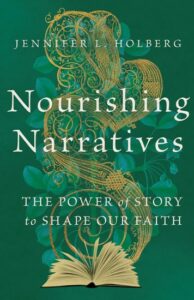 Thanks to those there who were so encouraging as I gave a whirlwind summary of our 40 years in the biz. And how about that panel conversation I got to be in with conference Director Jennifer Holberg (of Nourishing Narratives: The Power of Story to Shape Our Faith) and Ann Bogel and Karen Swallow Prior? What an honor to be with these smart women. For those that want a taste of the event, I’d seriously recommend Dr. Holberg’s wonderful book.
Thanks to those there who were so encouraging as I gave a whirlwind summary of our 40 years in the biz. And how about that panel conversation I got to be in with conference Director Jennifer Holberg (of Nourishing Narratives: The Power of Story to Shape Our Faith) and Ann Bogel and Karen Swallow Prior? What an honor to be with these smart women. For those that want a taste of the event, I’d seriously recommend Dr. Holberg’s wonderful book.
Plenary addresses were by Mitali Perkins, former poet laureate Tracy K. Smith, the wonderful Yaa Gyasi, and Anthony Doerr who gave a talk on similes. Wow.
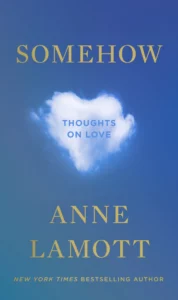 Over the past years there we’ve heard the great Katherine Paterson (whose lecture decades ago really was important for me — she even mentions it in her marvelous autobiography, Stories of My Life) and John Updike and Anne Lamott (we just got her brand new book in, last week, called Somehow: Thoughts on Love) and a workshop by Bruce Cockburn and presentations by Margot Starbuck and talk by James McBride (ooooh — I hope you know his recent novel The Heaven & Earth Grocery Store.) As with those older events, the FFW 2024 was excellent; it’s rare for us, being with so many like-minded people who care about the printed page and who champion, in various ways, the reading life.
Over the past years there we’ve heard the great Katherine Paterson (whose lecture decades ago really was important for me — she even mentions it in her marvelous autobiography, Stories of My Life) and John Updike and Anne Lamott (we just got her brand new book in, last week, called Somehow: Thoughts on Love) and a workshop by Bruce Cockburn and presentations by Margot Starbuck and talk by James McBride (ooooh — I hope you know his recent novel The Heaven & Earth Grocery Store.) As with those older events, the FFW 2024 was excellent; it’s rare for us, being with so many like-minded people who care about the printed page and who champion, in various ways, the reading life.
I suppose it is obvious that these people who are often very serious about Christian convictions but who hold their faith in a manner that makes room for others, who glory in what some might call “common grace”, and who value writing that raises the deepest questions of life (in novels and poetry, especially) that need not hammer down all the doctrinal details — yes, I suppose it is obvious that these are, in many ways, our tribe.
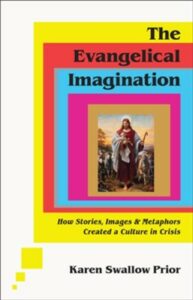 As I said, it was an amazing honor to get to do a workshop presentation, to be on a well-attended panel (with the energetic new friend Anne Bogel (her little gift book I’d Rather Be Reading is fabulous!) and the brilliant, longer-time pal, Karen Swallow Prior, author, most recently, of The Evangelical Imagination: How Stories, Images, and Metaphors Created a Culture in Crisis) and even say a few words at a reception for poet and memoirist Jeanne Murray Walker (celebrating her Slant Book Leaping from the Burning Train: A Poet’s Journey of Faith. I had named that one of my favorite books of last year.) To get to celebrate Beth’s 70th birthday with our dearest friends and to spend days hanging out with book people is a rare joy indeed.
As I said, it was an amazing honor to get to do a workshop presentation, to be on a well-attended panel (with the energetic new friend Anne Bogel (her little gift book I’d Rather Be Reading is fabulous!) and the brilliant, longer-time pal, Karen Swallow Prior, author, most recently, of The Evangelical Imagination: How Stories, Images, and Metaphors Created a Culture in Crisis) and even say a few words at a reception for poet and memoirist Jeanne Murray Walker (celebrating her Slant Book Leaping from the Burning Train: A Poet’s Journey of Faith. I had named that one of my favorite books of last year.) To get to celebrate Beth’s 70th birthday with our dearest friends and to spend days hanging out with book people is a rare joy indeed.
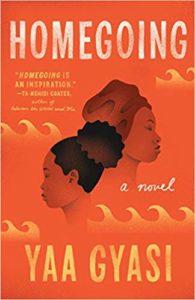
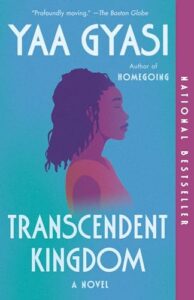 What a blast to hear authors we have written about here at BookNotes — Anthony Doerr (All the Light We Cannot See is a modern classic; Cloud Cuckoo Land, which Beth finally loved, is a bit more eccentric.) Yaa Gyasi (her Homegoing is truly epic, a must-read, and the follow-up, Transcendent Kingdom, as I’ve quipped before, is itself transcendent.) Tracy K. Smith’s latest is To Free the Captives: A Plea for the American Soul, about which it has been said to be “a stunning meditation on ritual and collectiveness that explores how older forms of inquiry — from song to prayer to ways of public gathering —might help us all survive violent times and address America’s shared history.” Imani Perry says she is “one of the most beautiful and profound writers of our time.” I very much loved her 2015 memoir Ordinary Light.)
What a blast to hear authors we have written about here at BookNotes — Anthony Doerr (All the Light We Cannot See is a modern classic; Cloud Cuckoo Land, which Beth finally loved, is a bit more eccentric.) Yaa Gyasi (her Homegoing is truly epic, a must-read, and the follow-up, Transcendent Kingdom, as I’ve quipped before, is itself transcendent.) Tracy K. Smith’s latest is To Free the Captives: A Plea for the American Soul, about which it has been said to be “a stunning meditation on ritual and collectiveness that explores how older forms of inquiry — from song to prayer to ways of public gathering —might help us all survive violent times and address America’s shared history.” Imani Perry says she is “one of the most beautiful and profound writers of our time.” I very much loved her 2015 memoir Ordinary Light.)
Anyway, it has been busy and exhausting and intimidating and refreshing. Thanks to those who prayed for my talks. We are grateful.
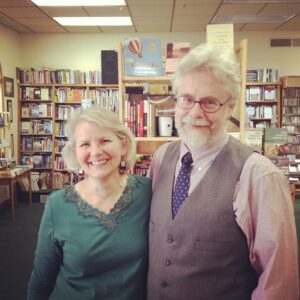 And it is true, so true: we would not have any standing to say anything at these sorts of events if we had not a loyal legion of friends and customers who have supported our efforts over these last decades to somehow reimagine and redefine the nature of a Christian bookstore. I know we’ve not pleased everyone, but we will be forever grateful for those who have hung in there with us, who send us orders regularly, who support our small-town shop here in south-central Pennsylvania. Thank you, readers and book-buyers. Without you, our customers, there would be no Hearts & Minds.
And it is true, so true: we would not have any standing to say anything at these sorts of events if we had not a loyal legion of friends and customers who have supported our efforts over these last decades to somehow reimagine and redefine the nature of a Christian bookstore. I know we’ve not pleased everyone, but we will be forever grateful for those who have hung in there with us, who send us orders regularly, who support our small-town shop here in south-central Pennsylvania. Thank you, readers and book-buyers. Without you, our customers, there would be no Hearts & Minds.
And so, a short but pointed BookNotes, inviting you to pre-order a soon-to-be released book coming from Baker Academic. I’m sure it has the name of a few of you on it, and I’m hoping others will generate some conversations around this forthcoming title. It’s remarkable, if a tad on the heavy side.
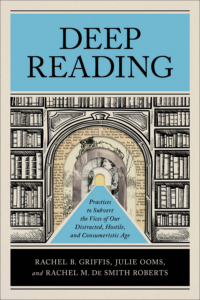 Deep Reading: Practices to Subvert the Vices of Our Distracted, Hostile, and Consumeristic Age Rachel B. Griffis, Julie Ooms, and Rachel M. DeSmith Roberts (Baker Academic) $24.99 OUR SALE PRICE = $19.99 // NOT YET RELEASED – Due May 28, 2024 PRE-ORDER NOW. (Scroll to the end of the column for the easy, secure link to the Hearts & Minds order form page.)
Deep Reading: Practices to Subvert the Vices of Our Distracted, Hostile, and Consumeristic Age Rachel B. Griffis, Julie Ooms, and Rachel M. DeSmith Roberts (Baker Academic) $24.99 OUR SALE PRICE = $19.99 // NOT YET RELEASED – Due May 28, 2024 PRE-ORDER NOW. (Scroll to the end of the column for the easy, secure link to the Hearts & Minds order form page.)
This is a book that captures so much about the nature of reading for people of faith these days that it seemed perfect, now, to highlight it. It is written by three college professors (all who have PhDs from Baylor University) who have followed diligently the recent spate of Christian books about the reading life, the values of reading, and the ways in which books can be an asset to our formation as Christian people. They bring us up to speed with a gracious bunch of hat-tips to authors and books that we love to promote, including:
- Booked: Literature in the Soul of Me by Karen Swallow Prior (T.S. Poetry Press) $19.99
- On Reading Well: Finding the Good Life Through Great Books (Brazos Press) $21.00
- Reading for the Common Good: How Books Help Our Churches and Neighborhoods Flourish C. Christopher Smith (IVP) $18.00
- Reading Black Books: How African American Literature Can Make Our Faith More Whole and Just Claude Atcho (Brazos Press) $19.99
- The Pleasures of Reading in an Age of Distraction Alan Jacobs (Oxford University Press) $21.99
- The Scandal of Holiness: Renewing Your Imagination in the Company of Literary Saints Jessica Hooten Wilson (Brazos Press) $24.99
- Reading for the Love of God: How to Read as a Spiritual Practice Jessica Hooten Wilson (Brazos Press) $24.99
- Reading the Times: A Literary and Theological Inquiry Into the News Jeffrey Brilbo (IVP) $27.00
Just their opening introductory chapter — laden with a tone of academese as it sometimes is — is nonetheless thrilling, engaging a growing consensus that reading is a 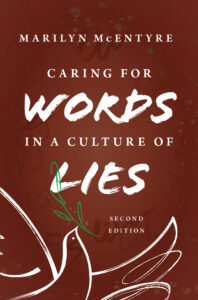 spiritual practice, that fiction and non-fiction both can be used by Godly folks seeking to be more alive to God’s world, and that in a culture that “amuses ourselves to death” with “restless devices”, we simply have to encourage the habits of reading widely and well. We must “care for words in a culture of lies” as Marilyn McEntyre puts it in her wonderful volume of that name. And, yet, they are not re-iterating what has been said; they are not preaching to the choir. This brings something new and important, if a tiny bit tedious, to the table.
spiritual practice, that fiction and non-fiction both can be used by Godly folks seeking to be more alive to God’s world, and that in a culture that “amuses ourselves to death” with “restless devices”, we simply have to encourage the habits of reading widely and well. We must “care for words in a culture of lies” as Marilyn McEntyre puts it in her wonderful volume of that name. And, yet, they are not re-iterating what has been said; they are not preaching to the choir. This brings something new and important, if a tiny bit tedious, to the table.
In fact, these authors are being a bit cheeky — carefully so, maybe too carefully so — in suggesting that while these books are helpful and good and proper and even transformational, they, in some ways, miss the mark by not going deep enough. That is, all of these aforementioned books, they claim, are mostly about the content of the books we read; we read in order to (however imaginatively and wisely) grasp the content, or at least be influenced by the content. I did not notice if they discussed C.S. Lewis’s famous lines in Experiments in Criticism that we are not to seek to “use” a book, but to “receive it” but it’s a helpful insight and apropos.
Their call to slower, engaged reading — “deep reading” as they call it — is less about what to read, but how to read.
And (big spoiler alert) they do not think the classic How to Read A Book by Adler and Van Doran is the right approach!
Their argument is bookish and they obviously enjoy reading widely. And they are very aware of the world in which we live, maybe more than most since they are teachers involved in the lives of young adults. There is no doubt —Griffis, Ooms, and Roberts, young, intelligent, women teachers that they are, get it.
They cite just the right stuff in their discussions of digital culture, including the fabulous research done about digital learning [done before the pandemic caused students everywhere to experience online learning, like it or not] called Digital Life Together: The Challenge of Technology for Christian Schools by David L. Smith, Kara Sevensma, Marjorie Terpstra, and Steven McMullen published by Eerdmans. What a joy to see them engaging the work of Maryanne Wolf (Proust and the Squid: The Story and Science of the Reading Brain and Reader, Home Home: The Reading Brain in a Digital World) and one of the very first serious books about reading that I read, the lovely The Gutenberg Elegies: The Fate of Reading in an Electronic Age by Sven Birkerts. Naturally, Nicholas Carr of The Shallows shows up, as does Neil Postman. They are not alarmists about Google or ebooks, but they are helpful by offering a balanced critique and refreshing ways to counter the ubiquity of the virtual and helping us find ways to read well in these digital times. They have a bit about “digital tools and equity”, too, which I found fascinating.
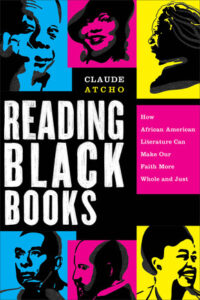 They are also astute about reading literature by and about people of color, of reading books by those different than ourselves, understanding well the liberative results of engaging black books or those written by those who are not from the dominant culture. From The Pedagogy of the Oppressed to James Baldwin through Claude Atchko and Esau McCaulley to bell hooks and, then, authors writing from the perspective of those who have disabilities, they offer fruitful insights. You will be struck, as I was, by their section called “Beyond the Diverse Reading List” offering “inclusive practices to cultivate listeners.” Oh my, this is vital, potent stuff.
They are also astute about reading literature by and about people of color, of reading books by those different than ourselves, understanding well the liberative results of engaging black books or those written by those who are not from the dominant culture. From The Pedagogy of the Oppressed to James Baldwin through Claude Atchko and Esau McCaulley to bell hooks and, then, authors writing from the perspective of those who have disabilities, they offer fruitful insights. You will be struck, as I was, by their section called “Beyond the Diverse Reading List” offering “inclusive practices to cultivate listeners.” Oh my, this is vital, potent stuff.
By the way, they interact with the work of Daniel Bowman, college English prof (and editor of a fine lit mag / poetry journal) and author of On the Spectrum: Autism, Faith, and the Gifts of Neurodiversity. They have a section on “neurodiversity, accommodation and attention.” Kudos, there. Well done!
One of the big projects going on here in Deep Reading — beside the insistence that we must learn how to read in a truly Christian fashion, not merely refining what to read, causes them to look askance at canon-making and book lists — is how the movement promoting the formation of a Christian worldview (especially in Christian higher education, although I’d say, we, too, here at Hearts & Minds) can become wooden, ideological, overly rationalistic. We’ve never tried to promote some dogmatic ideology of “worldview” but I hear their concerns.
There is more than can be said, I suppose, but they learned some of this critique of certain expressions of wordlviewishness, it seems, from the wonderful worldviewish scholar, 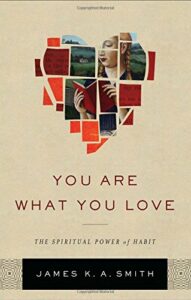 James K.A. Smith and they happily cite many of his works. From the deepest tracks in Desiring the Kingdom and Imagining the Kingdom to the one from the Top Ten Charts (You Are What You Love: the Spiritual Power of Habit, obviously) they use his work well, reminding us that we are shaped by habits, liturgies, ways of being in the world. The things we do, do things to us. That some people in Christian publishing and conservative circles promoted a rather rigid sort of worldview analysis, as if the notion of “worldview” was pretty much just old-school apologetics, is true enough, but not all uses of that word are connected with that kind of orientation.
James K.A. Smith and they happily cite many of his works. From the deepest tracks in Desiring the Kingdom and Imagining the Kingdom to the one from the Top Ten Charts (You Are What You Love: the Spiritual Power of Habit, obviously) they use his work well, reminding us that we are shaped by habits, liturgies, ways of being in the world. The things we do, do things to us. That some people in Christian publishing and conservative circles promoted a rather rigid sort of worldview analysis, as if the notion of “worldview” was pretty much just old-school apologetics, is true enough, but not all uses of that word are connected with that kind of orientation.
(Decades ago some of those who most popularized worldview language in at least some corners of evangelicalism, published a book called After Worldview edited by Matthew Bonzo & Michael Stevens, reflecting on ways not to use worldview rhetoric as a tool against others; it was a plea to rethink worldview language in an era of dogmatic weaponizing of what was once life-giving and imaginative. But I digress.)
I am not ready to say if I understand or agree with the ways Griffis, Ooms, and Roberts critically engage notions of worldviews, but I am glad whenever folks speak out about the things that matter most, and they are surely onto something that I think most Hearts & Minds readers will care about. Again: kudos. Again, Deep Reading, strikes a chord and is intriguing. You really should consider pre-ordering it.
They use David Smith’s pedagogical work a lot, too, like his “Reading Practices and Christian Pedagogy: Enacting Charity with Texts” found in Teaching and Christian Practices: Reshaping Faith and Learning edited by David L. Smith and James K.A. Smith. They even quote the rare David Smith book (co-written with Barbara Carville) on the habits of hospitality needed to teach foreign languages well, The Gift of the Stranger: Faith, Hospitality, and Foreign Language Learning, which we always carry. All in all, they understand that our social imaginaries, our ways of being in the world, our world-and-life views, are embodied through formative habits, not merely by dumping more data (even if that data is good Kingdom content) into our brains. By drawing on the unrelated Smiths — David and Jamie — they bring a depth and vitality to this project of helping us nurture a big vision of why and how we read and how deep reading can undo and redo our worldviews.
Which brings us back to the main premise of this fabulous, rich, deep, important work.
 They believe — and show, in impeccable detail — that reading deeply will equip us to be shaped by virtues that can help us withstand the onslaught of unhelpful forces (shall we call them vices?) emanating from the principalities and powers of our fallen world. In this sense, this heady study of reading seriously ends up being really, really influential about very basic matters of Christian formation.
They believe — and show, in impeccable detail — that reading deeply will equip us to be shaped by virtues that can help us withstand the onslaught of unhelpful forces (shall we call them vices?) emanating from the principalities and powers of our fallen world. In this sense, this heady study of reading seriously ends up being really, really influential about very basic matters of Christian formation.
They name three relevant vices in the subtitle, and they are potent — distraction, hostility, and consumerism. If reading well can help unseat the power of these disordered forces in our lives, then bring on the books!
And to think we can take pleasure in reading while fighting the unseen forces that surround us? Yes, ma’am. This is great!
These three women are giving us a great assist in spiritual formation and anyone who cares about Biblically-wise, vibrant, intelligent, whole-life discipleship in our culture, will find this immensely helpful and, I’d think, gratifying. It isn’t simple or even always fun, exactly, but it is nicely written, in a serious sort of way, and it is stimulating and challenging and generative. These teachers help us develop practices for discerning wise reading and for them, wise reading can be (must be?) subversive. That is, this is not a book merely making us feel guilty for not adequately wading through the important bibliographies from the classic Western canons.
Rather, Deep Reading says, we must learn to pay attention. (The first chapter is about cultivating temperance — you’ll be fascinated with the connection.) And then, their “prudent reading practices” help us move “beyond dogmatism.” Wow, this is provocative stuff.
I could offer more, but I’ll note one more thing. They talk a lot about reading communities. They are college educators, so I get that much of their experience is with professional colleagues who fret about efforts to shape their students. But I think many more of us are in “reading communities,” and even if their context is intentionally Christian higher education, if you are in a church, a Sunday school class, an on-line book club, a small group, or whatever, I think these deep reflections on deeper reading would be very influential in your ministry. Their reflection on “conversation as gift-giving” is beautiful stuff. This is not about reading for self-improvement or developing skills or becoming super-smart. The final chapter is about enjoyment, finally about “being human.”
Their earlier critique of consumerism leads them to big questions about what leisure is and the differences between entertainment and amusement. I had forgotten that pithy quote from Screwtape that they cite in a section about “practices that subvert consumerism” where a person says, after death, “I now see that I spent most of my life in doing neither what I ought nor what I liked.” Wow. This big afterword invites us to “reread.” It is a mighty ending piece, and it may leave you inspired or perplexed. Either way, it is unforgettable.
There are helpful summaries at the end of each chapter of the suggested practices. There are reflective questions to discuss (of course there are — they are inciting us to do this together, to become reading communities, after all.) These resources increase the value of the book quite a lot and you will be glad.
“This book eloquently joins the other voices calling us to soul-forming kinds of reading that can resist our descent into superficiality and hostility. Importantly, it goes beyond them in describing the actual practices that might get us there. All those who use text to teach others should read it. Anyone else who cares about reading and spiritual growth should join them.” — David I. Smith, Kuyers Institute for Christian Teaching and Learning, Calvin University
Pre-order this now and we will send it out at our 20% off discounted price as soon as it arrives.
+++
TO PLACE AN ORDER
PLEASE READ, THEN SCROLL DOWN AND CLICK ON THE “ORDER HERE” LINK BELOW.
It is helpful if you tell us how you want us to ship your orders. And if you are doing a pre-order, tell us if you want us to hold other books until the pre-order comes, or send some now, and others later… we’re eager to serve you in a way that you prefer. Let us know your hopes.
The weight and destination of your package varies but you can use this as a quick, general guide:
There are generally two kinds of US Mail options and, of course, UPS. If necessary, we can do overnight and other expedited methods, too. Just ask.
- United States Postal Service has the option called “Media Mail” which is cheapest but can be a little slower. For one typical book, usually, it’s $4.33; 2 lbs would be $5.07. This is the cheapest method available and seems not to be too delayed.
- United States Postal Service has another, quicker option called “Priority Mail” which is $8.70, if it fits in a flat-rate envelope. Many children’s books and some Bibles are oversized so that might take the next size up which is $9.50. “Priority Mail” gets much more attention than does “Media Mail” and is often just a few days to anywhere in the US.
- UPS Ground is reliable but varies by weight and distance and may take longer than USPS. Sometimes they are cheaper than Priority. We’re happy to figure out your options for you once we know what you want.
If you just want to say “cheapest” that is fine. If you are eager and don’t want the slowest method, do say so. It really helps us serve you well so let us know. Keep in mind the possibility of holiday supply chain issues and slower delivery… still, we’re excited to serve you.
BookNotes
SPECIAL
DISCOUNT
20% OFF
ALL BOOKS MENTIONED
+++
order here
this takes you to the secure Hearts & Minds order form page
just tell us what you want to order
inquire here
if you have questions or need more information
just ask us what you want to know
Hearts & Minds 234 East Main Street Dallastown PA 17313
read@heartsandmindsbooks.com
717-246-3333
Sadly, as of April 2024 we are still closed for in-store browsing. COVID is not fully over. Since few are reporting their illnesses anymore, it is tricky to know the reality but the best measurement is to check the waste water tables to see the amount of virus in the eco-system. It isn’t good. It is important to be aware of how risks we take might effect the public good — those at risk, while not dying from the virus, are experiencing long-term health consequences. (Just check the latest reports of the rise of heart attacks and diabetes among younger adults, caused by long Covid.) It is complicated, but we are still closed for in-store browsing due to our commitment to public health (and the safety of our family who live here, our staff, and customers.) Our store is a bit cramped without top-notch ventilation, so we are trying to be wise. Thanks very much for understanding.
We will keep you posted about our future plans… we are eager to reopen. Pray for us.
We are doing our curb-side and back yard customer service and can show any number of items to you if you call us from our back parking lot. It’s sort of fun, actually. We are eager to serve and grateful for your patience as we all work to mitigate the pandemic. We are very happy to help, so if you are in the area, do stop by. We love to see friends and customers.
We are happy to ship books anywhere.
We are here 10:00 – 6:00 EST / Monday – Saturday. Closed on Sunday.

